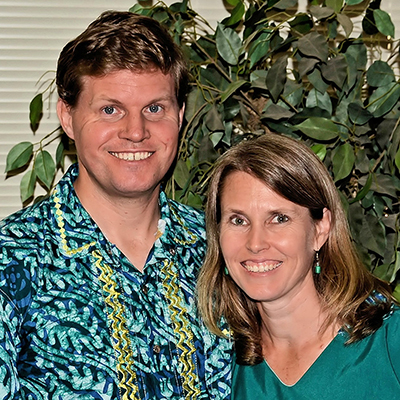Bob
As we seek to be a Matthew 25 community, both locally and globally, we recognize that racism and white supremacy are international projects which have been centuries in the making and which require a “full court press” to nullify and destroy these death-dealing ideologies, disarming these powers and principalities.

Bob and Kristi Rice
As Kristi and I have participated in Healing Hearts Transforming Nations (HHTN), a healing and reconciliation ministry in Rwanda, the Democratic Republic of Congo, and now South Sudan, we have learned the power of “Identificational Repentance,” or “Standing in the Gap,” a biblical concept modeled by Moses, Abigail, Ezra, Nehemiah, Daniel, and our Lord Jesus Christ. Jesus, as the Apostle Paul writes, “knew no sin, but became sin so that we might become the righteousness of God” (2 Corinthians 5: 21). Jesus accepted baptism, identifying himself with sinful humanity. Jesus died on a tree, the ultimate curse according to his community. Jesus stood in the gap, that we might be reconciled to God.
Are we called to follow this example of ‘standing in the gap’? In our mission service, Kristi and I have been learning that we also need to ‘stand in the gap’, to publicly acknowledge sinful attitudes and behaviors, and to publicly acknowledge and confess the sins of our people.
Kristi
A few months ago, I was in the rural town of Akobo on the border between South Sudan and Ethiopia, conducting one of these workshops with a team through our church partner. Towards the end of the workshop is this session about standing in the gap. I took the opportunity to verbally confess the harm that my ancestors, my people, did to people in South Sudan as we colonized South Sudan and imposed our laws, leaders, and systems upon them. Specifically in this area of Akobo, my people imposed a border that ran through the middle of Nuerland, dividing the people across two countries. I acknowledged our harmful attitudes of superiority and also apathy and unconcern as people in southern Sudan suffered under the oppression of the government of northern Sudan. I acknowledged that the harm begun during colonialism has impacts felt still today and that my people continue to inflict harm by our attitudes and actions in South Sudan. As I verbalized these specific actions, I personally felt grief and guilt at the ways that my people failed to respect and honor the dignity and autonomy of the peoples in South Sudan. I looked into people’s faces, grieving over the wrongs and seeing the grief on their own faces as they heard these realities recounted. At the end I asked if they could find the grace to forgive me and the people I represent. I also committed myself to work to change these attitudes and actions in myself and others.
One man stood up and said “What you have said is true. Those things happened, and we continue to suffer as a result. But we forgive you.” He came and took my hand, embracing me in an expression of his forgiveness.
My colleague Mama Sarah, who has experienced much suffering and loss and whose life is a powerful example of reconciliation, then stepped forward to confess the wrongs of her people. Mama Sarah is of the Dinka people, and there had been many attacks on this region of Akobo by Dinka and there was a long history of conflict between the Dinka and the Nuer in South Sudan. One striking thing is that Mama Sarah, although she is Dinka, speaks fluent Nuer and gave her confession in the Nuer language. She lamented the people who had been killed and the conflicts that had happened and identified herself with those who had done the killing as she asked for forgiveness.
A woman came up in response to Mama Sarah’s confession and narrated how some of her relatives had been killed by Dinka people and that for years she had been filled with anger and hate towards them. But now, after finding healing herself and hearing Mama Sarah’s confession, she felt able to forgive the Dinka people and release the anger she had been holding. She warmly expressed her forgiveness and thanks to Mama Sarah. We give thanks that God gave grace to forgive and to release some of the anger and hate among those gathered outside the Presbyterian Church in Akobo.
This time of confession came at the end of a three-day intensive workshop where we shared our wounds and pain together, looking to God as a source of healing and for the grace to forgive. But the workshop is hopefully just the beginning of living in a new way that seeks healing and repair in the communities of participants.
We hope that as God opens our hearts to see the ways that we have hurt each other, we can find the right opportunities to stand in the gap to acknowledge those harms and to ask for forgiveness. We recognize that “standing in the gap,” as such, is just the first step in addressing historical harm and moving towards repair and reconciliation. Verbalizing harms done and counting myself among the perpetrators helps me to see my need to interrupt cycles of harm and also take action for repair.
Bob and Kristi Rice serve the Presbyterian Mission Agency as mission co-workers in South Sudan. They originally offered a version of the above as a spoken presentation at the 2023 Vision Convocation of the Presbyterian Mission Agency.